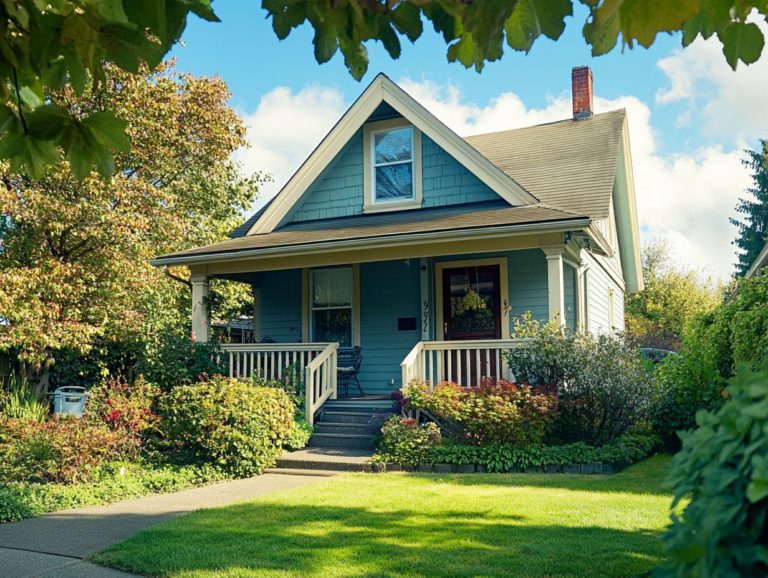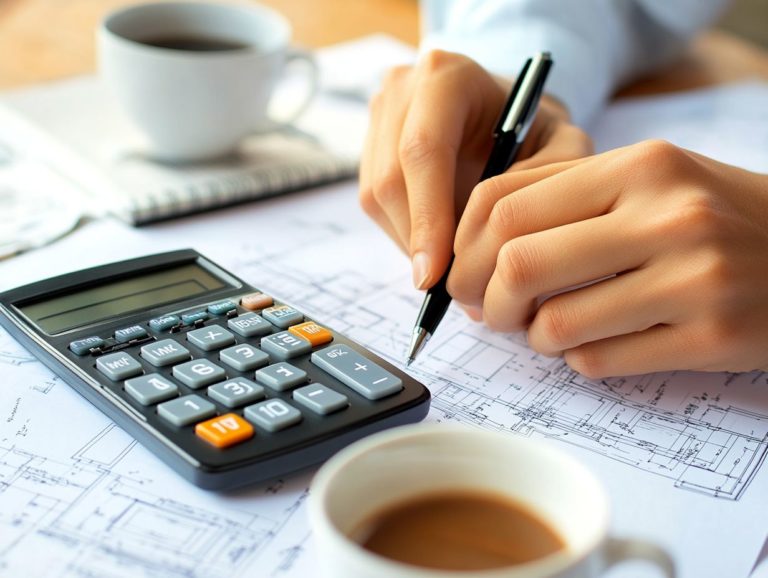Preparing Your Finances for Home Buying
Purchasing a home stands as one of the most monumental financial decisions you will ever encounter. Preparing your finances is key to ensuring a seamless experience.
This guide will walk you through the essential steps, from evaluating your current financial status and determining your budget to comprehending mortgage options and anticipating additional costs.
Whether you are venturing into homeownership for the first time or seeking to upgrade, you will find everything you need to position yourself for success in the real estate market.
Contents
- Key Takeaways:
- Assessing Your Financial Situation
- Creating a Savings Plan
- Understanding Mortgage Options
- Preparing for Additional Expenses
- Frequently asked questions
- What are the benefits of preparing my finances for home buying?
- How far in advance should I start preparing my finances for home buying?
- What are some common mistakes people make when preparing their finances for home buying?
- How can I improve my credit score to prepare for home buying?
- What should be included in my home buying budget?
- How Can a Financial Advisor Help Me Prepare My Finances for Home Buying?
Key Takeaways:
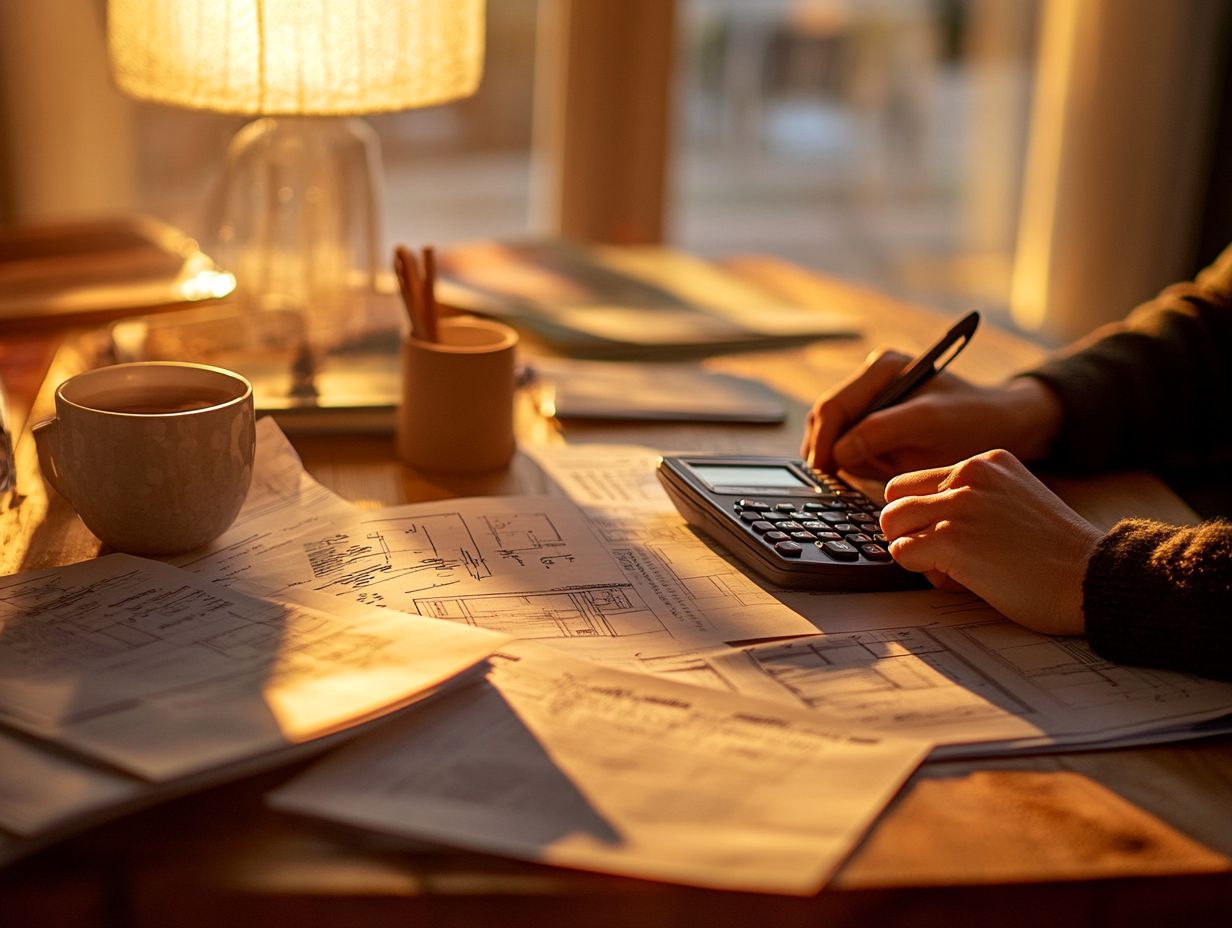
- Assess your financial situation by calculating your budget and reviewing your credit score to determine your home buying affordability.
- Create a savings plan by setting financial goals and implementing effective saving strategies to save for a down payment and other expenses.
- Understand mortgage options by researching the types available and preparing for additional expenses such as closing costs, maintenance, and upkeep.
Assessing Your Financial Situation
Assessing your financial situation is the first step in your journey toward homeownership, especially in today’s housing market.
Factors like financial stress can greatly influence your ability to secure that dream home.
By understanding your current budget, evaluating your savings, and analyzing your debt-to-income ratio (the amount of debt you have compared to your income), you can better gauge your readiness for house hunting.
It’s crucial to consider your total debt payments, credit score, and overarching financial goals. This enables you to create a tailored plan that aligns seamlessly with your home buying aspirations.
Calculating Your Budget
Calculating your budget is essential for achieving sustainable homeownership. It involves ongoing expenses like mortgage payments, property taxes, and homeowners insurance that significantly impact your monthly housing costs.
To develop a comprehensive understanding of your living expenses, you’ll need to consider both fixed costs such as those recurring mortgage payments and variable expenses, which can include utility bills and repairs that may vary from month to month.
It’s equally important to factor in other potential home-related costs, like routine maintenance, unexpected repairs, and home improvement projects, as you build your overall budgeting plan.
By diligently tracking these expenses over time, you can create a realistic budget that not only addresses your current needs but also prepares you for future financial demands.
Reviewing Your Credit Score
Reviewing your credit score is essential when you’re gearing up to buy a home. It plays a pivotal role in the loan approval process and can significantly influence the mortgage rates offered by lenders.
Understanding how to obtain and interpret your credit report is a key step in this journey. This document not only reflects your credit score but also provides valuable insights into your credit history, showcasing your payment timeliness and any outstanding debts.
Maintaining a robust payment history is crucial, as late or missed payments can seriously tarnish your score. However, you don t have to sit back and accept the status quo. You can enhance your credit standing by:
- Paying down existing debts
- Addressing any inaccuracies in your report
- Keeping credit utilization low
All of these actions are vital for securing favorable financing options before you start house hunting.
Creating a Savings Plan
Establishing a savings plan is crucial for anyone looking to buy a home, particularly first-time buyers.
It gives you the power to gather a substantial down payment, build a safety net for emergencies, and steadily progress toward your long-term financial aspirations in the world of home buying and ownership.
Start your journey now!
Setting Financial Goals
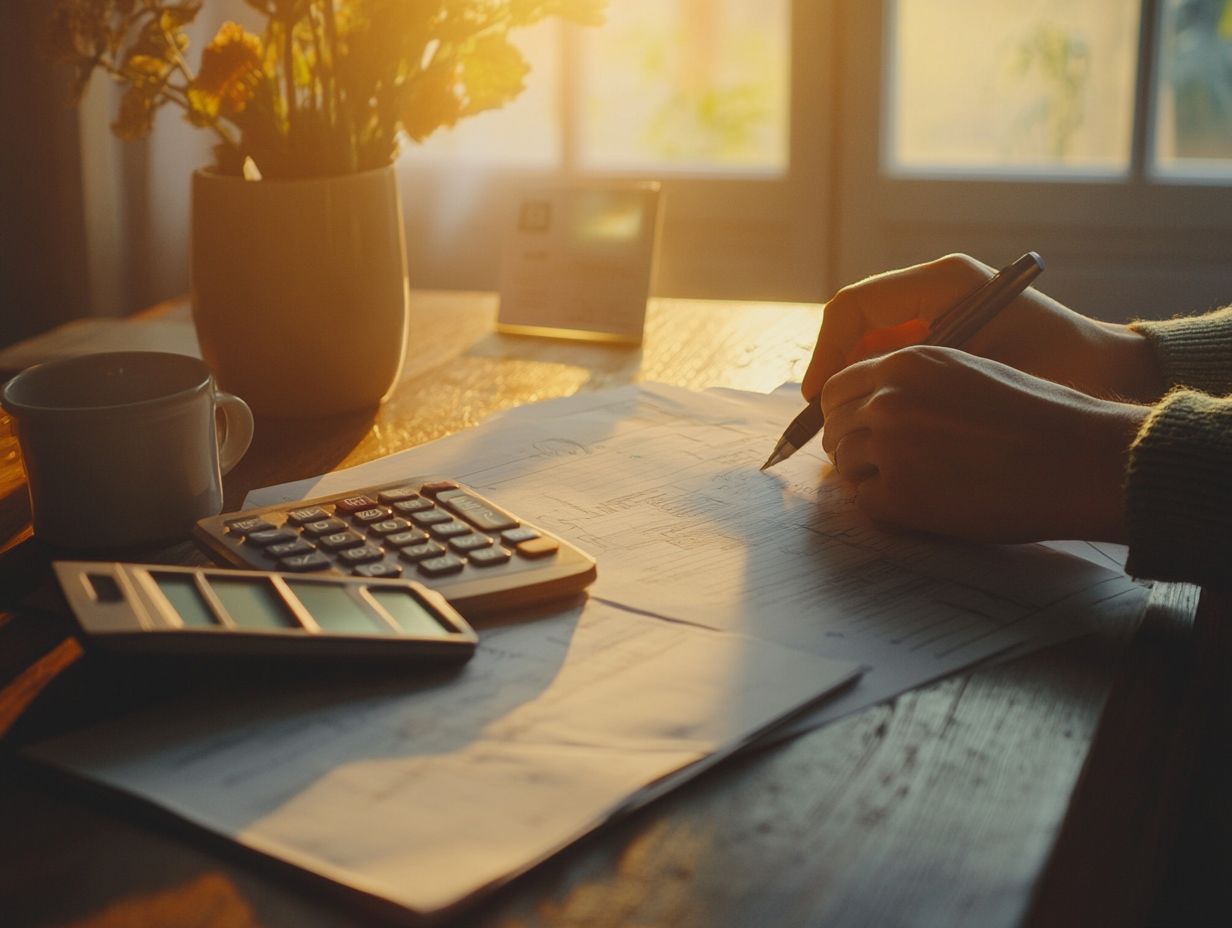
Setting financial goals is a crucial step in your journey toward homeownership. It guides you in outlining budget planning strategies for down payments, debt reduction, and other related costs.
By establishing clear and measurable objectives, you can prioritize your savings efforts while effectively managing essential expenses. Short-term goals, such as saving for a home inspection or closing costs, keep you focused and motivated.
On the other hand, long-term objectives like accumulating a substantial down payment lay the groundwork for robust financial health. These goals turn abstract aspirations into actionable steps, resulting in a clear financial plan that streamlines your budgeting processes and cultivates disciplined saving habits.
With this approach, you re on your way to a smooth and successful home buying adventure!
Effective Saving Strategies
Effective saving strategies can substantially enhance your financial readiness for purchasing a home. By leveraging savings accounts, capitalizing on favorable interest rates, and aligning your budgeting efforts with your homeownership goals, you can set yourself up for success.
Automating regular transfers to a dedicated savings account allows you to cultivate a seamless saving habit, ensuring steady progress toward your objectives.
Exploring high-interest savings options can further amplify your fund accumulation, maximizing your returns over time.
Utilizing budgeting tools offers invaluable insights into your spending patterns, giving you the power to make smarter financial choices.
These strategies not only simplify the savings process but also instill confidence as you draw nearer to realizing the dream of homeownership. Ultimately, this fosters a profound sense of security that arises from meticulous financial planning.
Understanding Mortgage Options
Understanding mortgage options is essential to your home buying journey. It gives you the power to select the most suitable financing solution tailored to your unique financial situation.
Whether you’re considering an FHA loan or exploring the array of mortgage rates from different lenders, knowing your options is key.
Types of Mortgages
You ll find a variety of mortgage types available to you as a homebuyer, including FHA loans, conventional loans, and adjustable-rate mortgages. Each boasts its own unique features and interest rates.
Know the pros and cons of each mortgage type to make a smart choice in your home financing journey.
FHA loans might catch your eye with their lower credit score requirements, but be aware that they often come with mandatory mortgage insurance premiums, which can add to your monthly expenses.
Conversely, conventional loans may offer you more flexibility with no upfront mortgage insurance, yet they typically demand a higher credit score and a larger down payment, which could pose a challenge for some buyers.
Adjustable-rate mortgages might seem appealing with their lower initial rates, especially if you’re budget-conscious. However, keep in mind that they can lead to increasing payments over time.
Don t wait! Evaluate your options now to make the best decision for your future.
Qualifying for a Mortgage
Qualifying for a mortgage involves meeting specific criteria set by lenders, including your credit score, debt-to-income (DTI) ratio, and the completeness of your financial documentation.
To navigate this intricate process effectively, you must first evaluate your credit profile. A higher credit score can greatly enhance your chances of securing favorable loan terms.
It s wise to scrutinize your credit reports for any errors and tackle any outstanding debts, as this can lower your DTI ratio another crucial factor lenders consider when assessing applicants.
Prepare thorough financial documents such as tax returns, pay stubs, and bank statements ahead of time. This can simplify the application process, showcasing your financial stability and responsibility.
By understanding these key elements, you can take significant steps toward improving your mortgage qualification prospects.
Preparing for Additional Expenses
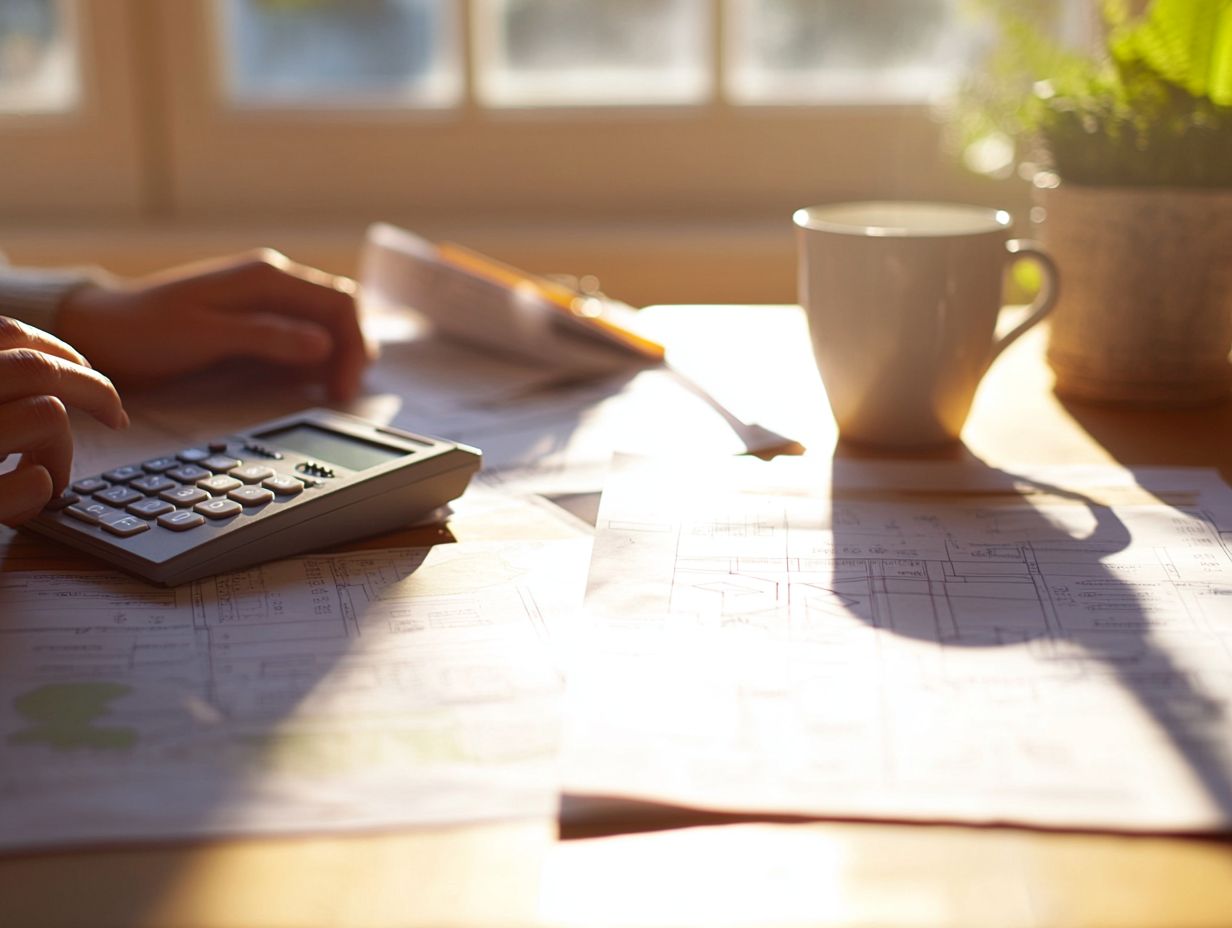
Preparing for additional expenses beyond the purchase price is essential for you as an aspiring homeowner. This means understanding the details of closing costs, anticipating ongoing home maintenance, and recognizing related financial responsibilities such as property taxes and homeowners insurance. Start today to avoid missing out on the perfect home!
Being well-informed about these factors gives you the power to navigate the homebuying journey with confidence and clarity.
Closing Costs and Other Fees
Closing costs are a considerable expense in your home buying journey, which include various fees, such as inspection costs, property taxes, and charges from financial institutions and your real estate agent.
These expenses can accumulate rapidly, making it essential for you to grasp the complete financial landscape. Typically, standard closing costs range from 2% to 5% of the home’s purchase price and may involve fees for title insurance, appraisals, and loan origination.
It s vital for you to budget for these costs ahead of time; overlooking them could lead to unexpected financial strain. By thoroughly researching and planning for each component, you can ensure a smoother transition into homeownership and sidestep any last-minute surprises that could disrupt your purchasing experience.
Home Maintenance and Upkeep
Home maintenance and upkeep are ongoing expenses you should always anticipate, as they are important tasks for preserving your property value and ensuring a comfortable living environment.
By taking the time to understand these responsibilities, you can manage household costs more efficiently while enhancing your property’s overall appeal. Regular inspections of important systems, such as plumbing and electrical work, alongside timely repairs, will help you avoid costly damage down the line.
Don t forget to include seasonal tasks like gutter cleaning and HVAC servicing in your maintenance plan. Budgeting for these expenses not only shields you from unexpected financial burdens but also facilitates long-term planning for home improvements, making it easier to maintain both the value and functionality of your property.
Frequently asked questions
What are the benefits of preparing my finances for home buying?
Preparing your finances for home buying can give you a better understanding of your budget and how much you can afford to spend on a house. It can also help you secure a better mortgage rate and increase your chances of getting approved for a loan. Being financially prepared makes the home buying process smoother and less stressful.
How far in advance should I start preparing my finances for home buying?

You should start preparing your finances at least 6-12 months before you plan to buy a home. This will give you enough time to improve your credit score, save for a down payment, and gather all necessary financial documents.
What are some common mistakes people make when preparing their finances for home buying?
One common mistake is not checking your credit score before starting the home buying process. Your credit score plays a major role in determining your mortgage rate and the amount you can borrow. Not having a budget or underestimating the costs of homeownership can also be a mistake. It’s important to factor in all expenses, such as maintenance, property taxes, and insurance, when budgeting for a new home.
How can I improve my credit score to prepare for home buying?
To improve your credit score, you can start by paying your bills on time and in full. Avoid opening new lines of credit or making large purchases before applying for a mortgage. It’s also important to check your credit report for any errors and dispute them if necessary.
What should be included in my home buying budget?
Your home buying budget should include the down payment, closing costs, monthly mortgage payments, property taxes, insurance, and any other expenses related to home ownership. It’s also recommended to have some savings set aside for unexpected expenses or emergencies.
Start preparing your finances now!
How Can a Financial Advisor Help Me Prepare My Finances for Home Buying?
A financial advisor offers custom advice and support for your home buying journey. They help you create a budget and improve your credit score.
Furthermore, they guide you to determine what you can afford for a home. They ll also help you explore different home loan options and find the best rates for you.
With their help, you can confidently step into home buying and make your dream a reality!



